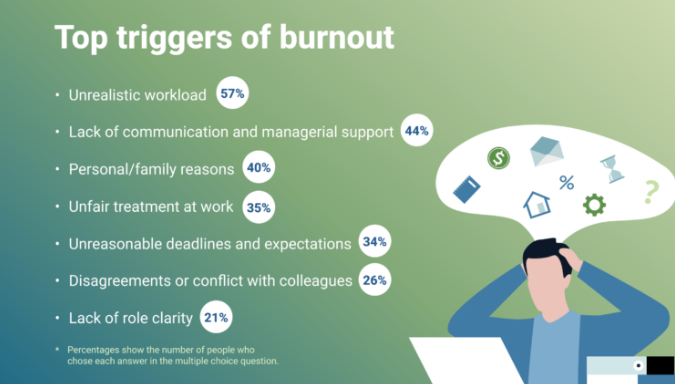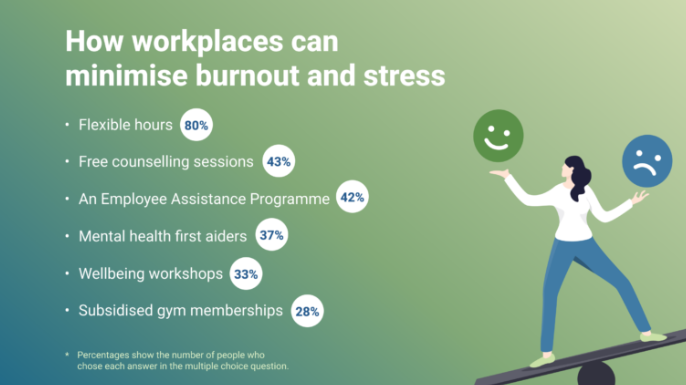Experiencing stress and burnout in the workplace can be all too common for employees. However, the causes and costs of these issues might be part of an altogether larger problem. Businesses should take care of their employees and ensure they receive the best treatment. The priorities of employees have changed since Covid-19, with home and hybrid working having a huge influence on typical working practices.
So, how do people feel about burnout and stress, and what are employers doing to relieve this? SEFE Marketing & Trading conducted a study to find out. The study was created by surveying over 850 UK employees across different sectors and age groups. The aim? To find out how many people have been affected by burnout, its main causes, and whether employees think their employers are doing enough to prevent it. The results revealed an in-depth view of how employee burnout affects personal relationships, work-life balance, and mental health.
For what reasons have you experienced stress or burnout in the past?
 The study found that an unrealistic workload is the most common cause of stress or burnout, with 57% of employees stating this as one of their reasons. An unrealistic workload appears to be a prominent work-life issue affecting over half of those surveyed.
The study found that an unrealistic workload is the most common cause of stress or burnout, with 57% of employees stating this as one of their reasons. An unrealistic workload appears to be a prominent work-life issue affecting over half of those surveyed.
Elsewhere, lack of communication and managerial support came in as a close second, with just under 44% stating this as their cause of stress and burnout. Communication issues could stem from a rise in remote working, although some might argue that software such as Slack, Teams, and Zoom allows for better communication with colleagues from anywhere.
For all the flexibility that remote working brings, it does have its downsides, which may explain why communication issues are featured so often in the survey. For example, employees miss out on those “water cooler” moments, it’s difficult to voice issues and concerns to senior staff, and different working practices may make those day-to-day duties more difficult and time-intensive.
The third-top answer to this question was a lack of role clarity. While this doesn’t appear to be a common reason, a lack of role clarity might lead to a bigger issue, such as an unrealistic workload. Ambiguous titles could be stretching employees across multiple teams or departments, or leaving them without clear management communication, for example.
Has your work ever interfered with or caused friction within your personal life and/or relationships with your friends and family?
62% of employees say their work has interfered with their personal life or relationships with friends and family. Whether employers expect too much from their employees, people take work home, or the work itself affects them personally – the issues being faced can negatively affect work-life balance in multiple ways.
The industry most affected by a seemingly poor work-life balance is sales, with 88% answering yes. Meanwhile, those working in marketing, advertising, and PR also had high numbers of people whose work has interfered with or caused friction with their personal life.
Younger people (18-34-year-olds) are reportedly more affected by burnout with 64% answering yes. However, this prompts questions about whether young people are more aware of work and mental health boundaries than the older generations. While this could suggest that younger generations have experienced more burnout, the disparities could also simply be put down to greater awareness.
Do you feel like your company is doing enough to minimise burnout?
 Minimising burnout in the workplace is a highly discussed topic. However, the survey found that nearly three-quarters (71%) of employees feel that their company isn’t doing enough to minimise burnout.
Minimising burnout in the workplace is a highly discussed topic. However, the survey found that nearly three-quarters (71%) of employees feel that their company isn’t doing enough to minimise burnout.
Sales scored the highest on this question, with 88% responding with no. Employees working in the sales industry clearly don’t feel that their employers are doing enough to protect them from burnout, which could be due to the fast-paced environment and often-changing schedules not allowing for meetings or check-ins.
Employees in hospitality and events management also responded with an 80% no, which could be due to similar reasonings to those working in sales. Most managers in hospitality get there through length of service, and it’s known as an industry for not providing much in terms of management training, which could contribute to a sense of stress and burnout.
On a more positive note, the energy and utilities sector scored highest for those that feel their company is doing enough to minimise burnout, with a yes response rating of 43%.
Out of the employees asked, the age group with the highest volume of no answers to this question was 55-64, with 73% saying they feel their company isn’t doing enough. This group was closely followed by ages 25-34 (71%) and 35-44 (70%).
What measures do you feel workplaces should implement to minimise burnout and stress?
Implementing measures to minimise burnout is essential for maintaining good employee-employer relationships. Employees feel that the most fundamental measure companies should implement to minimise burnout and stress is flexible working hours, with a response rate of 80%. However, this might not be possible for all industries. If your business doesn’t offer flexible hours and you’re considering implementing them, you’ll need to assess how processes could be affected.
Free counselling sessions were the second most common answer (43%), followed closely by employee assistance programmes (42%). Both responses have a mental health focus, which could mean that businesses need to step up mental health support for their employees. Of course, costs are involved, and these need to be weighed against the benefits.
Do you feel that a higher salary would be an appropriate trade-off for a greater likelihood of experiencing burnout?
The results were fairly evenly split on this question. Just over half (52%) of employees feel that a higher salary would be an appropriate trade-off for a higher risk of experiencing burnout. However, an almost equal amount (48%) disagrees.
Younger generations seem to be more in agreement that a higher salary is appropriate compensation for a higher chance of burnout, with 72% of 18–24-year-olds and 69% of 25–34-year-olds answering yes to this question. The overarching issue behind this could be that employee salaries don’t adequately reflect job roles, skills, and working conditions.
The disparities between sectors provide interesting insight into this issue, as leisure, sport, and tourism answered highest for yes responses, while IT employees responded highly for no. This raises questions about different industries, their pay, and the stress imposed by working within them.
Are those that disagree doing so because they feel overworked regardless of pay? Or do those responding with a yes feel that their work is less stressful, and higher pay would easily offset any issues?
How many annual holidays does your workplace offer?
We asked this question to try to find out whether a lower amount of annual leave days correlates with a higher chance of employee burnout. Most employees (61%) stated that they’re offered 21-30 days of annual leave each year, followed by 20 days (22%) and then 31-40 days (17%).
The most interesting statistic is that the industry with the most annual leave days is education. Although they often receive more than 31-40 days of annual leave due to half-term breaks and the summer holidays, they might spend some of those days working. Teachers and professors often spend their time off marking work and planning lessons, which means they may have less time off than what is written in their contracts.
Questions should be asked about whether those with more time off can enjoy it due to taking work home and the mental strain it might place on their personal lives and relationships.
Have you ever taken time off due to experiencing stress or burnout? If so, how much time off have you taken?
This question split people almost down the middle again, with 48% of employees having taken time off due to experiencing stress or burnout, and 52% answering that they haven’t.
The biggest difference we see is with age ranges. Over 65s mostly responded with no, while 55-64-year-olds had the highest number of participants to have time off due to burnout or stress.
While the older generation has been in employment for longer, they might not recognise when they require time off for their mental health. Meanwhile, the slightly younger generation could be better educated about burnout and stress.
Have you ever left a job because of burnout?
Most employees haven’t left a job because of burnout, although the percentage of those who have left for this reason (41%) is relatively high. Businesses might need to implement more employee support systems to prevent future resignations for this issue and reduce staff turnover.
Industries with the most employees who’ve left a job due to burnout include recruitment and HR (67%), marketing, advertising, and PR (64%), and energy and utilities (57%).
The generational differences could reinforce the idea of a perspective shift to putting mental health first, as 18-24-year-olds had the highest rate of yes answers while over 65s and 45-54-year-olds had the highest rate of no answers.
Do you feel as though a move towards a four-day working week would have a positive effect on your own feelings of stress or burnout?
The study found that 82% of employees believe that a four-day working week would positively impact their own feelings of stress and burnout. The four-day workweek has been trialled numerous times in recent years, with lots of reported success in the UK and around the world. With flexibility becoming more important, could it be worth considering cutting down the number of days your employees work?
Flexibility around work and life are some of the top-voted measures for helping to manage workload and work life, so this could be a step in the right direction for your company.
However, it’s also worth thinking about whether the four-day week can realistically be rolled out across all industries. While 88% of employees in the education sector said yes, this could require drastic changes to the UK educational system.
The potential impact on industries could be huge, although reducing burnout and stress among employees could be worth it.


